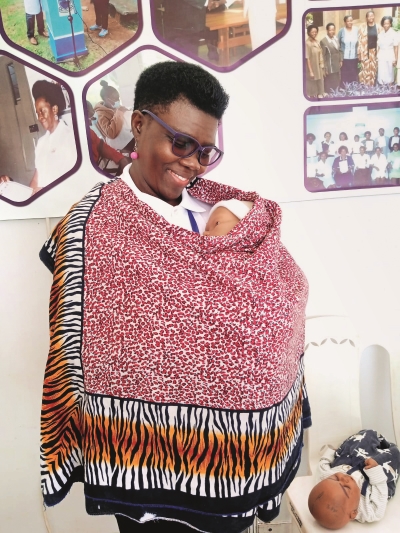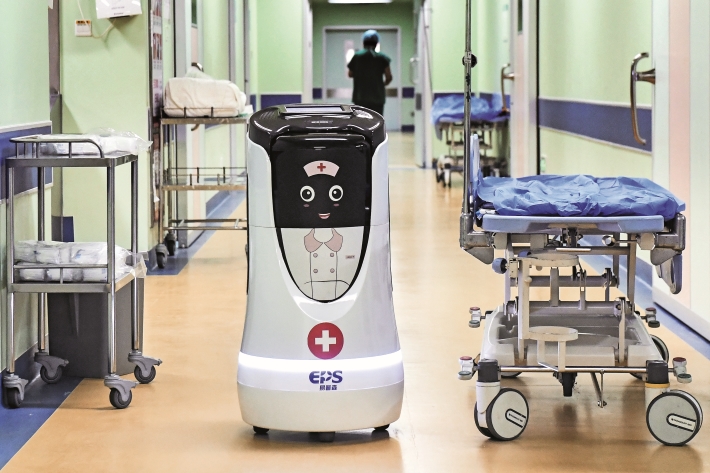|
||||||||||
| Home Top News Economy/Tech Culture/Sports China in Foreign Eyes Green Development Videos Intangible Cultural Heritages |
|
||||||||||
| Home Top News Economy/Tech Culture/Sports China in Foreign Eyes Green Development Videos Intangible Cultural Heritages |
| ChinAfrica |
| Saving Young Lives |
| Kenyan hospitals use artificial intelligence to assist medical staff in curbing high infant mortality rates |
| By Gitonga Njeru | VOL. 16 August 2024 ·2024-07-30 |

A staff member demonstrates infant care at Kenyatta National Hospital in Nairobi, Kenya, on 6 July 2022 (KENYATTA NATIONAL HOSPITAL)
Joy Mueni, 29, is a mother of two young daughters born at the Kenyatta National Hospital in Kenya, the largest referral and teaching hospital in East Africa.
Living in Kenya’s capital Nairobi, Mueni has experienced firsthand the challenges of maternal and child health care in Kenya. The country has long struggled with high infant mortality rates, a problem exacerbated by limited access to quality health care, inadequate medical infrastructure, and a shortage of trained medical professionals.
For Mueni, each pregnancy was filled with a mixture of excitement and anxiety, as she hoped for the best but feared the worst.
Recently, however, Mueni’s concerns about infant health and safety have been somewhat alleviated, thanks to a groundbreaking new initiative at the Kenyatta National Hospital. Chinese doctors, along with their Kenyan counterparts, have introduced advanced artificial intelligence (AI) technology to help to curb the high rates of infant deaths in Kenya.
This cutting-edge AI system is designed to assist health care providers in diagnosing and treating conditions that can lead to infant mortality.
The introduction of AI in the medical field has been a game-changer. The systems can analyse vast amounts of medical data quickly and accurately, identifying patterns and anomalies that may be missed by human eyes.
At the Kenyatta National Hospital, the AI technology is being used to monitor vital signs of newborns, predict potential health issues, and provide real-time support to doctors and nurses.
Mueni said on her latest visit to the hospital, it was incredible to see how the doctors and AI worked together.
“The machine would alert the staff if there was any sign of trouble with the babies. It gave me a lot of confidence that my children were in good hands,” she said.

Recent years have seen increased AI application in the medical sector (CNS)
Introducing AI
One of the key figures in this initiative is Li Mei, a renowned Chinese paediatrician and AI specialist. Li has been instrumental in implementing AI technologies at Kenyatta National Hospital. “AI can process information from various sources such as heart rate monitors, respiratory sensors, and other medical devices. It helps us to predict complications before they become critical, allowing us to intervene much earlier,” she said.
The implementation of AI technology at Kenyatta National Hospital is part of a broader collaboration between Kenya and China aimed at improving health care outcomes, said Patrick Amoth, acting director general of medical services at the Ministry of Health of Kenya.
This collaboration has spread to other maternity hospitals. This partnership includes training local medical staff to use the new technology effectively and ensuring that the systems are adapted to meet the specific needs of Kenyan patients.
Since the introduction of AI, there has already been a noticeable improvement in infant health outcomes at the hospital. The mortality rates have started to decline, and many parents, like Mueni, feel a renewed sense of hope and security.
Her story is one of many that highlight the positive impact of technological advancements in health care. As she watches her daughters play, she reflects on the difference that these innovations have made in her life and the lives of many other families.
“I am grateful for the efforts to improve health care in our country. It means a lot to know that our children have a better chance of growing up healthy and strong,” she says.
The journey towards reducing infant mortality in Kenya is ongoing, but with the continued integration of AI and other advanced technologies, there is a promising path ahead. The collaboration between Kenyan and Chinese medical professionals is a testament to the power of international cooperation in tackling global health challenges. Now, major hospitals are applying AI on a large scale to slow down the high rates of newborn deaths.
“AI has a promising future in preventing newborn deaths in Kenya. Using AI to get large amounts of data from medical records and genetic information is crucial,” said Li.
According to her, AI is providing a future path to identify medical patterns and abnormalities that go undetected by human doctors and often result in misdiagnosis and medical negligence.
“Early diagnosis and intervention can be enhanced through the use of AI in medical settings to identify genetic abnormalities. We do this in the case of cystic fibrosis, sickle cell anaemia and haemophilia, a disorder in which blood doesn’t clot normally, leading to excessive bleeding from even minor injuries. These are among the most common diseases in children,” said Li, adding that AI has led to better treatment due to early diagnosis of these diseases.
In addition, AI has helped to reduce mother to child transmission of HIV, as well as provide improved drug therapy treatment to HIV-positive mothers.
“Kenya and China have [inked] several bilateral agreements over the years. Historically, both countries have partnered in COVID-19 vaccine trials. Borrowing from other countries and sharing our own local innovation is beneficial to our health sector,” said Amoth.
Kenya’s high-tech march
According to data from the World Population Review, in 2022, the infant mortality rate in Kenya was 31.76 per 1,000 live births. But last year, the rate dropped slightly to 30.63 deaths per 1,000 live births. According to the World Health Organisation data, the global average in 2022 was 17.3.
At the Aga Khan University Hospital in Nairobi, AI analyses a child’s medical history and even genetics. This helps doctors to create a unique personalised treatment programme for each individual child.
“Many AI tools have been developed by both Chinese and Kenyan doctors to monitor disease as well as diagnose diseases relating to neonatology,” said Amoth.
The tools are being used to fight the most common neonatal diseases. This includes respiratory stress syndrome, perinatal asphyxia, apnoea of prematurity, jaundice, among others. Meanwhile, many cases from regional East and Central African countries are also referred to Kenyan hospitals for advanced AI treatment.
While the AI tools are generally developed by Kenyan innovation, Chinese partnerships are playing a major role in helping Kenya to become a global leader in medical innovation. This has led to Chinese doctors setting up their own clinics in Kenya. The clinics are affordable to the public and use the latest AI technologies.
“We hope that things will improve and [we] have zero deaths per 1,000 live births. Can it happen? Yes, it can,” said Guo Chongli, a Chinese doctor at the Hope Clinic in Nairobi.
And despite being a developing country, Kenya is ranked as one of the global leaders in AI.
At the Eastern Africa Sub-Regional Forum on Artificial Intelligence in Nairobi late June this year, Gabriela Ramos, UNESCO’s assistant director general for social and human sciences, presented the Kenya AI Readiness Assessment Report. She praised the country’s global ranking of 24th in ICT. She also praised its strong performance in ICT service and fintech. “Kenya’s leadership in AI readiness sets a benchmark for the region,” Ramos said. “We look forward to conducting these assessments for 21 other African countries. This will foster a continent-wide approach to AI.”
|
||||||||||||
| About Us | Contact Us | Advertise with Us | Subscribe |
| Copyright Beijing Review All rights reserved 京ICP备08005356号-5 京公网安备110102005860号 |